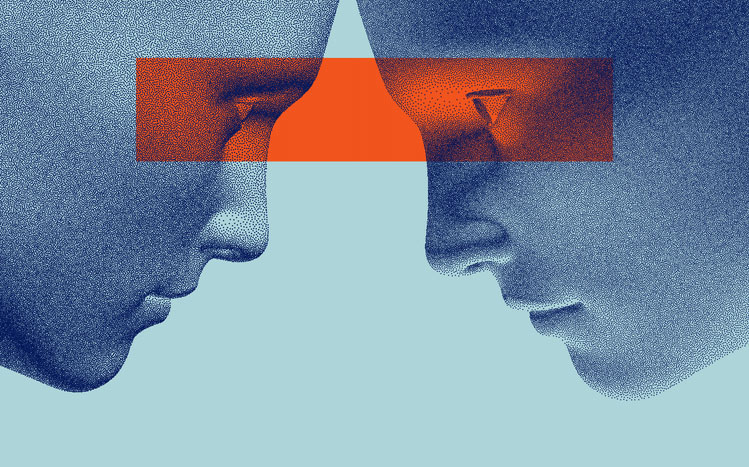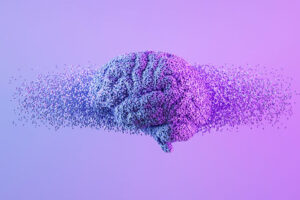Written by Scott Wilson

Psychology figures prominently in the history of artificial intelligence. Early researchers in the field realized pretty quickly that they didn’t really know what they meant when they coined the term. Before they could truly define what success would look like in creating a machine intelligence, they needed to know more about the yardstick they were measuring against: human intelligence.
Before we work on artificial intelligence why don’t we do something about natural stupidity?
~ Stephen Polyak, neuroanatomist
Psychology, and particularly neuropsychology, offered insights into the processes of human intelligence they were trying to replicate.
So maybe it’s only natural that AI has turned around to offer a helping hand in the practice of psychology today.
Psychology Has Always Been a Vital Part of AI Research and Development
 It’s no accident that many of the early luminaries in the AI world came to it through a background in psychology. Both Allen Newell and Herbert Simon, the pioneers behind the Logic Theorist program that represented the first automated reasoning software, had backgrounds in cognitive psychology.
It’s no accident that many of the early luminaries in the AI world came to it through a background in psychology. Both Allen Newell and Herbert Simon, the pioneers behind the Logic Theorist program that represented the first automated reasoning software, had backgrounds in cognitive psychology.
The crossover between understanding the human mind and the machine mind has been a through-line in the history of AI development. In fact, one of the first recognizable chatbots was specifically built to emulate the interactions of a Rogerian psychotherapist.
ELIZA, created by Joseph Weizenbaum and running a script called DOCTOR, was designed to explore natural language interactions between man and machine. With rudimentary pattern-matching that would reflect back the statements of the user as the psychotherapeutic school of Carl Rogers’ suggested. Although somewhat simplistic and eventually repetitive, it was one of the first programs capable of attempting the Turing test.
Weizenbaum discovered something shocking, though. It turned out the Turing test was easy to beat. Many users developed a rapid emotional attachment to ELIZA; his own secretary even asked Weizenbaum to leave the room so she could continue her conversation with the machine in private.
What Are the Potential Uses for AI in Psychology?
 Modern chatbots are even more capable and may reveal even more strange corners of the human psyche. And they point to the most longstanding and obvious opportunity for AI in psychology: talk therapy.
Modern chatbots are even more capable and may reveal even more strange corners of the human psyche. And they point to the most longstanding and obvious opportunity for AI in psychology: talk therapy.
Psychologists have quickly jumped on the capability of generative algorithms for both assessment and treatment purposes. Studies have shown that chatbots have been able to deliver competent, if not brilliant, cognitive behavioral therapy.
As chatbots were being first released right in the teeth of the COVID-19 pandemic, automated therapy was one of the first clear uses.
While the ethical issues of treatment by robot are thorny and not yet fully explored, it’s clear that people are already using ChatGPT and other programs in that capacity.
Diagnostics is a more clear-cut use of AI in psychology. Machine learning algorithms can plow through vast amounts of information and identify risk factors far more subtle than human psychologists. Already, generative AI is being used to conduct mental health assessments with natural language and to identify patients with suicidal tendencies for targeted interventions.
Maybe one of the biggest uses for AI in psychology will be on the research front. Not only do they represent a new way to probe individual responses and reactions to the idea of living machines, but their abilities to penetrate large sets of data and reveal new trends and findings are unparalleled.
These kinds of studies rest at the intersection of data science and artificial intelligence. Machine learning, the common tie between the two, can also be used to create artificial neural networks that offer a digital representation of the biological machinery of human cognition. That opens up new avenues of comparative study for research psychologists.
In fact, AI is a valuable new tool in the field of computational cognition. A discipline that first started to come together in the wake of the Second World War, the idea that the mind might follow mathematical principles was part of what lead to AI breakthroughs like neural networks. But it continues to also be a technique through which psychologists attempt to unravel the actual processes of the human mind.
A more intriguing example of that is the suggestion that AI models could be used as a substitute for humans in psychological experimentation. It’s almost the opposite of the ethical question of using chatbots for treatment—experimenting on AI has none of the thorny problems of consent, ethics board approval, or potential for abuse that exists with human subjects. But since the models offer responses so similar to humans, they may return valid results from carefully constructed studies.
What Kind of Jobs Will Exist in Psychology for AI Professionals?
 AI specialists working in psychology can fill roles as diverse as product manager and engineer. AI researchers work closely with research psychologists in experimental efforts at universities and healthcare centers.
AI specialists working in psychology can fill roles as diverse as product manager and engineer. AI researchers work closely with research psychologists in experimental efforts at universities and healthcare centers.
But some of the key roles for AI professionals may be a little closer to the user level.
As psychotherapeutic chatbots start to roll out, the need for professional AI prompt engineers and AI trainers with psychological skills will be immense. The sensitivity of such uses will require fine-tuning and testing to an enormous degree. This means that jobs working directly to hone generative AI systems for startups and healthcare systems will be both plentiful and high-paying.
You can get some idea what the average salaries for these roles and more will be by checking out our AI salary guide.
What Are the Best Degrees for Getting Started in AI for Psychology?
 For AI professionals starting a career in building tools in psychology, it’s an opportunity to forge new ground. That will start with the process of earning the right degree to prepare you for that career.
For AI professionals starting a career in building tools in psychology, it’s an opportunity to forge new ground. That will start with the process of earning the right degree to prepare you for that career.
While biomedicine, medical imaging, and even public health are concentrations that are available in some Master of Science in Artificial Intelligence degree programs, you won’t find psychology on the list. Maybe the closest option is a degree such as a Master of Science in Intelligent Systems Engineering Neuroengineering track.
These degrees throw together coursework in deep learning and artificial neural networks with studies of the basis of memory systems, explorations of the nervous system, and theories of mind that may all be useful in developing AI applications for psychologists.
For AI trainers and prompt engineers, who may not need such advanced degrees, something like a Bachelor of Science in Artificial Intelligence, or a Bachelor in Computer Science with an AI focus, may be qualification enough. The general studies requirements at the bachelor’s level leave a lot of room to bone up on electives like pathopsychology, cognitive science, and development across the human lifespan that are important in psychological work.
Specialist Degree Programs Deliver Training That Spans Both Human and Artificial Reasoning
 But there are some related degrees that are tailor-made for combining psychological and computational AI.
But there are some related degrees that are tailor-made for combining psychological and computational AI.
A Master of Science in Computational Psychology comes with most of the groundwork behind a degree in machine learning. Packed with statistical methodology, quantitative analytical methods, and Bayesian data analysis, the degrees also come with training in valuable psychological concepts like:
- Research Design in Psychology
- Cognitive Modeling
- Functional Neuroanatomy
Some coding concepts and ML features like algorithm design and neural network training are also often part of the program. Similarly, a Master of Science in Applied Cognition and Neuroscience with a Computational Modeling/Intelligent Systems specialization comes at the challenges from the same direction.
Of course, anyone coming in from a psychology background, or even with a degree in computational psychology, is likely to benefit from additional instruction in AI and ML. That’s where a graduate or Postgraduate Certificate in Artificial Intelligence and Machine Learning can come in handy.
Designed for people with a strong math and science background, these certs offer a handful of focused college classes that usually take less than a year to complete. They offer a strong overview of AI development principles and programming. In some cases, they are even more focused on specific fields, like a Graduate Certificate in AI Medicine.
Students who already have a degree in AI or computer science, on the other hand, might benefit from certificates expanding their understanding of psychological uses of AI. A Graduate Certificate in Cognitive Science can help tie some of the principles together.
The relationship between psychology and artificial intelligence are only going to strengthen in the years to come. Anyone with an education that overlaps both fields is likely to find plenty of opportunities in either.

